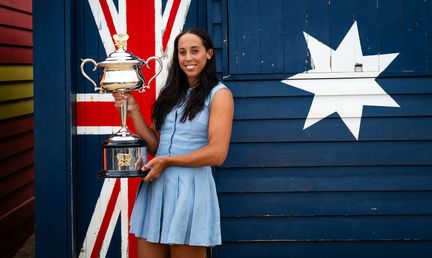RIYADH, Saudi Arabia --There are no more singles scenarios.
The 12 group matches at the WTA Finals Riyadh presented by PIF are in the past. Only three knockout meetings remain -- two fraught, frenzied semifinals on Friday and the final on Saturday.
The fabulous four features three ultra in-form players:
World No.1 Aryna Sabalenka has won 22 of 24 matches, Zheng Qinwen is 30-5 since Wimbledon, Coco Gauff is riding a 11-2 streak.
WTA Finals Riyadh: Scores | Schedule | Standings
The outlier? That would be Barbora Krejcikova. The Wimbledon champion has played only 32 matches this year -- the other three averaged 56 victories.
As the last singles match began Thursday night, there were actually three semifinal matchups still in play. But after Krejcikova’s 7-5, 6-4 victory over Gauff the grid was set.
We make the case for each of the semifinalists:
No.7 Zheng Qinwen (2-1) vs. No.8 Barbora Krejcikova (2-1), 6 p.m. local time
Head-to-head: 1-0, Zheng, a 2-6, 6-2, 6-4 winner in the Zhengzhou final
The case for Zheng
She is absolutely feeling it right now.
After losing her opening match to Sabalenka, Zheng did this:
- Finished off Elena Rybakina and Jasmine Paolini with decisive 6-1 final set scores.
- Produced nine service breaks while suffering only three herself.
- Hit a tournament-high12 aces against Paolini -- and no double faults. She’s got 26 in three matches, against nine doubles, a plus-15 ratio far ahead of the field.
“In this tournament, and then the rest of the half year, this first time, I felt like, ‘Wow, the serve start to be back,’ ” Zheng said. “Because I remember on 2022 my serve also was quite strong, but I don’t know why suddenly in 2023 the serve start to drop without any reason.
“And then right now, I’m just really happy about what I’m doing on court with my serve.”
Greatness has long been predicted for the 22-year-old from China, but it’s swiftly come to fruition this year. There was a dip after the finals at the Australian Open, but after winning the Olympic singles gold medal she caught fire in Asia, reaching the semifinals and finals of the WTA Tour 1000 events in Beijing and Wuhan and taking the title in Tokyo.
Zheng is the youngest player to make the semifinals at the WTA Finals in her first appearance since Petra Kvitova in 2011.
The case for Krejcikova
Heading into this year’s WTA Finals, Krejcikova was, in some ways, the anomaly. She didn’t crack the Top 8 in the Race to the Finals. Instead, she earned her spot through a qualifying rule that grants a Grand Slam champion ranked within the Top 20 a shot at the Finals. Some might say she wasn’t on anyone’s radar for a deep run -- until now.
In her opening match, Krejcikova had defending champion Swiatek on the ropes -- up a set and two breaks -- before Swiatek staged a comeback. But that close call didn’t faze Krejcikova. She regrouped, took out Jessica Pegula in straight sets and headed into a high-stakes match against Gauff with one goal: win and move on to the semifinals.
CZECH-MATE ♟️@BKrejcikova takes the No.1 position in the Orange Group after defeating Gauff in consecutive sets! #WTAFinalsRiyadh pic.twitter.com/XiN0vT7UrX
— wta (@WTA) November 7, 2024
Could she pull it off? With Gauff already through and under less pressure, all eyes were on Krejcikova to see if she could make it happen -- and she didn’t disappoint. Facing four break points at 6-5 in the first set and another four in the second, she played her most focused tennis yet, clinching the win and securing the No.1 seed in her group and a match with Zheng.
“I look forward to that match,” Krejcikova said of her next opponent. “I know it’s going to be very difficult. She’s been playing quite well. I had more ups and downs than she did. It’s also visible in the rankings. Here we are in the semis, it’s the last four of this event. Yeah, just looking forward.”
And along the way, Krejcikova made some history, becoming the first player ranked outside the WTA’s Top 10 to win two matches at the Finals since Elena Dementieva in 2000. So, the question remains: Can Krejcikova go all the way? At this point, why not?
No.1 Aryna Sabalenka (2-1) vs. No.3 Coco Gauff (2-1), to follow
Head-to-head: 4-4
The case for Sabalenka
This year: Sabalenka was a 7-6 (2), 6-4 winner in the semifinals of the Australian Open and, more recently, 1-6, 6-4, 6-4 in the Wuhan semifinals.
She came into the final group match having clinched a berth in the semifinals, while Rybakina, at 0-2, had already been eliminated.
Cue the predictable letdown. There was a racquet smash, frustration and some bad body language in scenes reminiscent of early 2020s Sabalenka. She lost 6-4, 3-6, 6-1, but her postmatch press conference indicated just how far she’s come.
“Honestly, this is something I have to learn, is how to keep myself motivated and hungry and like being 100 percent on in this kind of matches,” Sabalenka said. “And you see someone up on another side, and especially with such high-level player who has nothing to lose.
“I would say that emotionally, the first set, I was really off, and that’s something I have to fix before the semis.”
After pausing her season by skipping Wimbledon and the Olympics, Sabalenka has been sublime. She won three big titles -- in Cincinnati, the US Open in New York and Wuhan -- and had the year-end No.1 ranking well in hand even before she arrived in Riyadh.
Sabalenka is the first player to reach back-to-back semifinals at the WTA Finals as World No. 1 since Serena Williams in 2013-2014. Before losing to Rybakina, she had won eight consecutive matches against Top 10 players.
The case for Gauff
Even though she had already qualified before the Krejcikova match, Gauff showed some real grit in defeat.
With Krejcikova serving for the first set at 5-4, Gauff scored a break and actually forced four break points. It played out almost exactly the same way in the second set, with Gauff amassing four more break points -- and saving two match points before Krejcikova pulled it out.
While Krejcikova had much more at stake and has demonstrated an unusual calm in critical situations, Gauff responded admirably. It’s not always easy to remember that she’s still only 20 years old -- nearly nine years Krejcikova’s junior.
A month ago, she won six matches at the WTA 1000 event in Beijing and now has collected a career-high 52 wins.
Gauff went into her group match against Swiatek having won one of 12 against her. Showing uncommon moxie, she won that one.
“I got comments about how I was going to lose badly today,” she said afterward, “so I was just like, `OK, we’ll see.’ Honestly just liking the idea of just proving people wrong and, and letting your racquet do the talking.
“So, yeah, I use it as motivation.”










